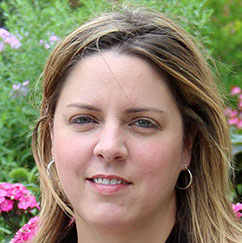
Alana Pindar
Weston Family Visiting Professor in Ecosystem Health and Food Security, Cape Breton University
I am a community ecologist who studies the impact of environmental stressors on wild bee communities. Bees are the single most important taxonomic group of pollinators, comprised of more than 20,000 species essential to both agricultural production and maintaining wild plant diversity. Wild bees, and the pollination services they provide, appear to be in global decline with reported losses documented across multiple continents. Several causal factors for global bee declines have been suggested, including long-term anthropogenic land use change, climate change, parasites and pathogens, invasive species and the increasing use of agrochemicals. Whilst the scientific community has started to build consensus on how such environmental stress factors might affect bees, particularly honeybees and bumblebees, we know almost nothing about how these factors might affect wild bee communities. These wild bee communities have historically provided us with ‘free’ crop pollination services and it alarming to consider bee declines have already, or will in the future, lead to pollination deficits and reduced food production. We urgently need to understand how the full range of anthropogenic stressors could impact bee communities across a range of landscapes and spatial scales.
Contact Expert
Please provide the required information below to contact Alana Pindar.
I am a community ecologist who studies the impact of environmental stressors on wild bee communities. Bees are the single most important taxonomic group of pollinators, comprised of more than 20,000 species essential to both agricultural production and maintaining wild plant diversity. Wild bees, and the pollination services they provide, appear to be in global decline with reported losses documented across multiple continents. Several causal factors for global bee declines have been suggested, including long-term anthropogenic land use change, climate change, parasites and pathogens, invasive species and the increasing use of agrochemicals. Whilst the scientific community has started to build consensus on how such environmental stress factors might affect bees, particularly honeybees and bumblebees, we know almost nothing about how these factors might affect wild bee communities. These wild bee communities have historically provided us with ‘free’ crop pollination services and it alarming to consider bee declines have already, or will in the future, lead to pollination deficits and reduced food production. We urgently need to understand how the full range of anthropogenic stressors could impact bee communities across a range of landscapes and spatial scales.
ADDITIONAL TITLES AND AFFILIATIONS
- Post Doctoral Fellow- University of Ottawa
Video Interviews
No video interviews available
Audio Interviews & Podcasts
No audio interviews available
Print or Digital Media
Time Magazine
Article for paper published in Science
2015-07-08
Global news
Media from Science paper
2015-07-08
Op-Eds
No op-eds available
Public Speaking Events
No public speaking events available
Appearances
No appearance available
Books
No books available
Research
Published by Science Magazine
Published by Science Magazine
BSc
in BiologyAcadia University
MSc
in Entomology; Restoration EcologyYork University
PhD
in Pollination; BiodiversityYork University
Video Interviews
No video interviews available
Audio Interviews & Podcasts
No audio interviews available
Op-Eds
No op-eds available
No public speaking engagements available
Books
No books available
Research
Published by Science Magazine
Published by Science Magazine
BSc
in BiologyAcadia University
MSc
in Entomology; Restoration EcologyYork University
PhD
in Pollination; BiodiversityYork University
LOCATION
Cape Breton, Nova Scotia, Canada
LANGUAGES SPOKEN
SPECIALIZED BEATS
EXPERTISE
RECOGNITION
Webster Postdoctoral Fellow
Established in honour of the late Earle J.D. Webster, the Webster Post-Doctoral Fellowship in Environmental Sciences was created to fun ground-breaking environmental science research toward making a better planet. Webster attended OAC in 1927, and later went on to distinguish himself as an elementary school educator and author. He showed lifelong interest in both geology and forestry.
